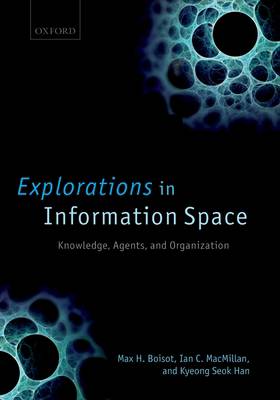
- Retrait gratuit dans votre magasin Club
- 7.000.000 titres dans notre catalogue
- Payer en toute sécurité
- Toujours un magasin près de chez vous
- Retrait gratuit dans votre magasin Club
- 7.000.0000 titres dans notre catalogue
- Payer en toute sécurité
- Toujours un magasin près de chez vous
Explorations in Information Space
Knowledge, Actor, and Firms
Max H Boisot, Ian C MacMillan, Kyeong Seok Han
Livre relié | Anglais
169,45 €
+ 338 points
Description
With the rise of the knowledge economy, the knowledge content of goods and services is going up just as their material content is declining. Economic value is increasingly seen to reside in the former - that is, in intangible assets - rather than in the latter. Yet we keep wanting to turn knowledge back into something tangible, something with definite boundaries which can be measured, manipulated, appropriated, and traded. In short, we want to reify knowledge. Scholars have been debating the nature of knowledge since the time of Plato. Many new insights have been gained from these debates, but little theoretical consensus has been achieved. Through six thematically linked chapters, the book articulates the theoretical approach to the production and distribution of knowledge that underpins Max Boisot's conceptual framework, the Information Space or I-Space. In this way the book looks to provide theoretical and practical underpinnings to Boisot's book Knowledge Assets(OUP, 1998). Following an introductory chapter, how knowledge relates to data and information is first examined in chapter 1, and how different economic actors - entrepreneurs, managers, etc - use knowledge as a basis for action is explored in chapter 2. Chapter 3 looks at how the heterogeneity of economic actors arises naturally from their respective data processing strategies in spite of any similarities in the data that they might share. Chapter 4 argues, contra much transaction-based economics, that an organizational order must have preceded a market order, something that should be reflected in any knowledge-based theory of the firm. Chapter 5 discusses the cultural and institutional significance of different kinds of knowledge flows. Finally, chapter 6 presents an agent-based simulation model, SimISpace, that illustrates how the I-Space might be applied to concrete problems such those of intellectual property rights. A concluding chapter proposes a research agenda based on the theorizing developed in the book. The approach the book sets out is used by a whole range of organizations to issues of knowledge management, policy, economics, and organizational and cultural change.
Spécifications
Parties prenantes
- Auteur(s) :
- Editeur:
Contenu
- Nombre de pages :
- 242
- Langue:
- Anglais
Caractéristiques
- EAN:
- 9780199250875
- Date de parution :
- 15-03-08
- Format:
- Livre relié
- Format numérique:
- Ongenaaid / garenloos gebonden
- Dimensions :
- 156 mm x 234 mm
- Poids :
- 517 g

Les avis
Nous publions uniquement les avis qui respectent les conditions requises. Consultez nos conditions pour les avis.






